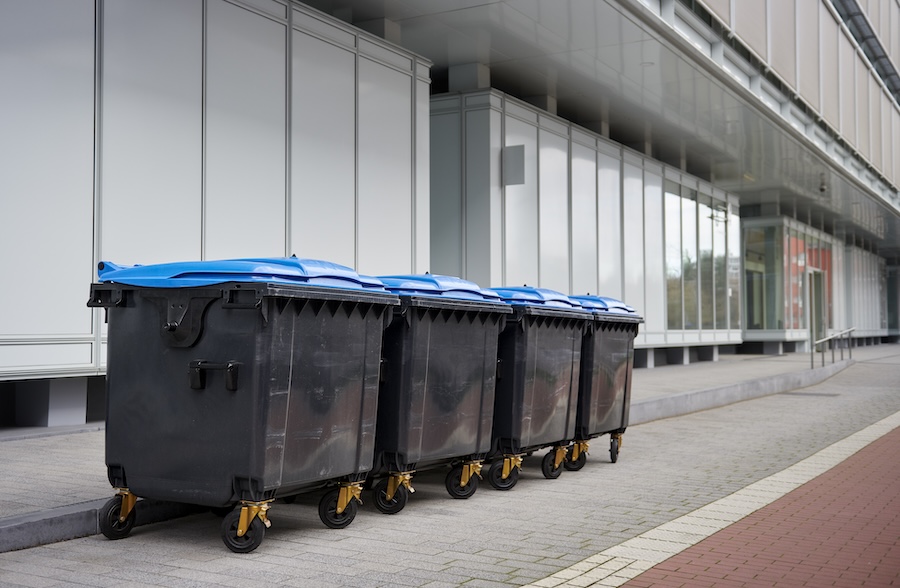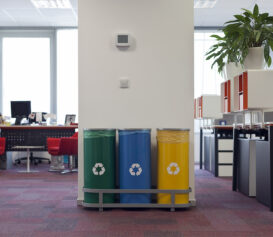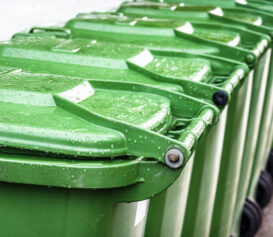While August was quiet (hence no monthly Council roundup), the first week of September brings adopted rules for DSNY containerization, proposed clarifications for AEUHAZ1 penalties, and the DOHMH 2025 FY agenda. Here’s what you need to know:
DSNY Containerization
The DSNY released two adopted rules after public feedback on their proposed containerization changes. Each rule focuses on how collection is performed – either by city agencies, or private carters.
If You Get NYC Agency Pickups
In general, this new adopted rule requires “that all buildings that receive Department collection or collection from another City agency, other than residential buildings containing ten or more dwelling units, set out any refuse at the curb for collection in rigid containers with tight-fitting lids.” The requirement starts on November 12, 2024, with requirements to purchase specific lids from authorized vendors kicking in by June 1st, 2026.
The department clarified items from the proposed rule, including the effective date, and that containerization requirement apply to all waste set out at the curb, including if such waste is collected by another city agency. Buildings can apply for a waiver if compliance “would create a public safety hazard for pedestrians or would pose an unreasonable hardship.”
The full adopted rule can be seen here. It goes into effect on October 4, 2024, about a month before the requirement officially begins.
Get more details about the DSNY’s containerization plans here, including information for buildings with 10+ units.
If You Use A Private Carter
Buildings using private carters (commercial establishments, mostly) have a different set of requirements:
- Buildings can set out waste and recyclables within one hour of closing, provided that the scheduled collection occurs before the re-open of business
- And only if such materials are placed out for collection in receptacles with tight-fitting lids
- Collection placed in bags, regardless of closing time, may place materials at the curb no earlier than 8 PM
Additionally, “DSNY rules currently require that all commercial establishments set out any putrescible solid waste at the curb for private carter collection in rigid containers with tight-fitting lids.” The newly adopted rule amends this and expands this requirement to include any entity, not just commercial establishments, that receives private carter collection.
Similar to residential properties, non-commercial establishments may request a waiver if compliance would create a public safety hazard for pedestrians or pose a hardship. Cited examples in the adopted rule summary of “non-commercial establishments” include office buildings and hospitals.
View the adopted rule text here, and get more details about containerization for businesses on DSNY’s site.
PS – Another helpful resource is DSNY’s training series, like this video on the expansion of curbside composting requirements.
AEUHAZ1 Proposed Rule
Following Local Law 50 of 2022, the DOB is cementing AEUHAZ1 changes with a newly proposed rule covering the following:
- The minimum penalty for failure to certify correction of an immediately hazardous condition is removed, leaving the $5,000 penalty intact
- 1-4 family homes are exempt from the penalty
- Violations eligible for this penalty are limited to immediately hazardous conditions issued at construction sites
- The civil penalty must be paid before a Certificate of Correction can be accepted on the initial violation
The text of the proposed rule also outlines guidelines for challenging an AEUHAZ1, and the issuance process.
Users with SiteCompli or InCheck accounts can always review Class 1 violations with outstanding correction statuses or open AEUHAZ1s in their account. Of course, if you have any questions, reach out to support@sitecompli.com or your Customer Success Manager. We’re always happy to help!
DOHMH FY 2025 Agenda
Another agency’s agenda for the coming year is in – this time it’s the Department of Health and Mental Hygiene. It’s mostly focused on mobile food vending fees and adjustments, which isn’t entirely relevant to property owners and managers. That said, it could be useful information if you’re dealing with vendors onsite and want to stay informed. Click here for more details.
As of now, based on the Council’s schedule, we still expect most updates for owners and managers to come in October. That said, we’ll continue to keep you posted on rules, bulletins, and any other updates that come in between.




